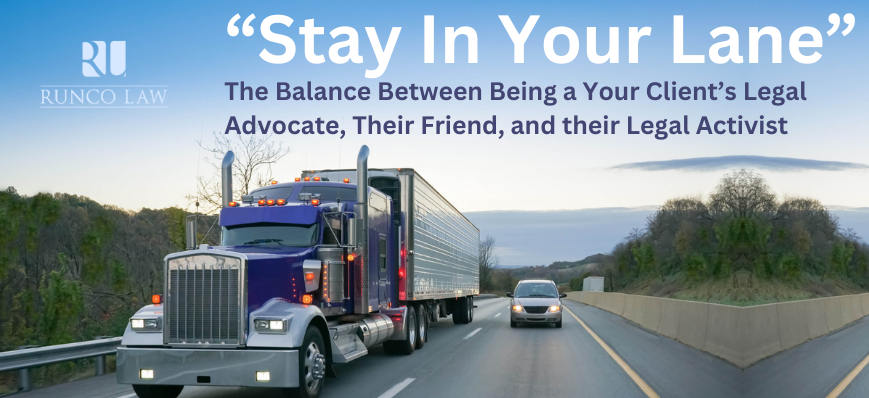As I approach the end of my 50s, I sometimes reflect on the work I have done for my clients, and I truly hoped they know that I tried my best to represent their interests. When I was a young lawyer, I did not have the wealth of experience that I now have, but I had the passion and energy to fight my client’s battles aggressively and tenaciously. As a more seasoned lawyer, I no longer have the desire to simply fight it out in court as my initial option, but rather, I recognize the benefit of mediation, other dispute resolution methods, and using litigation as the last option, but as an option, nevertheless.
However, that does not mean that I am “waiving the red flag.” I am quite happy and energized to go to court when I see that this is the only option left to maintain and preserve my client’s rights. I loath a bully, and my experience has allowed me to become highly skilled enough to bring the legal fight to a bully. But sometimes, clients wants me to go the extra mile (kilometer?) and jump into the ring and need me to hate their ex-partner, their family, their friends, their existence, etc. as if I have been part of the past/current family conflict that they have lived. Not only am I unable to do so, as I do not have the client’s “lived experience” to develop that animosity, I am unwilling to do so, as I would lose any objectivity that is essential to allow me to work effectively for my client.
This blog will be about the need for the lawyer to remain compassionate and attuned to the client’s legal needs, and not to become the client’s emotional support person, a co-dependent in the litigation, or zealous activist. Clients need to understand that there is a difference between my skills and ability to be their legal advocacy, and that I am not a party to “their cause.”
I am my client’s lawyer, not their friend
When I first meet with my client, I listen to them, I advise them accordingly, I generate options, and eventually, I take their instructions on the next steps to take. I then put it in writing in a retainer letter to ensure that the client and I are on the same page and they understand what I plan to do for them as their lawyer. This includes setting out the limit of what I can and cannot do. As a mentor of mine once explained to me many years ago, I must be friendly with my clients, but I mustn’t be their friend.
Objectivity
As I said above, to be effective, a lawyer must be passionate about their role, but not personally invested in the client’s success. The lawyer should always be objective, and not have any “skin in the game,” other than to do the work professionally and effectively, and to get paid for their services. If this is not the case, and the lawyer has a vested interest in the matter, they lose their objectivity. Their subjectivity blurs their ability to do their job. As a lawyer, if I have an emotional interest in my client’s case, I blur the line of whether the options to be presented, and the decisions to be made, are best for the client, or are they best for me? This is unavoidable if I have become invested in the “win.”
Cannot Offer Guarantees
In my retainer letter, I remind the client that they are responsible for paying for my time, advice, and representation, and not for the results obtained. Why? Because as good as I am as a lawyer, I cannot guarantee that they will be successful, as that is a function of many other factors beyond my control, such as the facts of their case, the state of the law, the credibility of their evidence, and the judges who will decide their legal fate.
Consoling vs. Advising
As a friend, we sometimes tell our friends what they want to hear to console them and support them. We spare them from the harsh truth, especially if the friend is not in a good emotional state to hear the harsh truth of the matter. I am “a shoulder to lean on” for my friends, and recognize that they’ve been wronged. I cannot do this for my client. Rather, as their lawyer, I must be able to tell them in an honest, straightforward, but compassionate way that, despite having been a wonderful husband and a doting parent, they will be obliged to pay spousal support, split their pension and will only see their kids on alternate weekends, even though their estranged wife pulled the plug on the marriage after 20 years.
Risk of Crossing the Line and Becoming “More than a Friend”
Over 30 years, I have seen a few cases where a colleague of mine has crossed the line and not only have they become a friend of their client, but they have developed a romantic interest with their client. Trust me when I say that it is very easy to for a lawyer to fall into this quagmire. A client may see their lawyer as a “knight in shining armor” and their personal warrior/avenger, and this can create a misguided sense of the lawyer’s underlying role and desire to do what they are doing. A client can confuse a lawyer’s dynamic and effective advocacy as “he’s fighting for me, so they must love me.” Conversely, I have known a few lawyers who see themselves as the person who has rescued their client from peril and vanquished the enemy, and in doing so, have fallen ion love with their client.
Putting aside the complete loss of emotional objectivity and the likely inability to advocate effectively in such situations, the lawyer is a now at risk of professional misconduct. Over the last number of years, the Law Society of Ontario (the LSO) has been clear with its members (lawyers and paralegals) that such a “crossing the line” from a professional to a personal relationship will likely be seen as a breach of trust and an abuse of the power dynamic between a trusted professional and a vulnerable client. This has not always been the case, as in years past, it was deemed a matter between consulting adults and it was discouraged but not necessarily acted upon. That’s no longer the case.
If the lawyer and client do see themselves as more than lawyer and client, then it is best for the lawyer to remove themselves immediately from the professional equation as the client’s lawyer. Strangely enough, this often seems to coincide with when such romantic relationships fizzle, as well. No need to comment further.
The Legal Activist
Although I was born in the 1960s, I was not a “child of the 1960s” and I have no personal recollection of all the social, moral and legal upheaval that took place in that turbulent decade. But what has survived, if not thrived, over the last 50 plus years is the role of lawyers to influence change. Family Law is no stranger to the evolution of the law through legal activism – the recognition of support and property rights of women in marriages, and then in common laws relationships, the role of men in parenting roles, the availability of marriage and its consequential rights to same sex couples, to name but a few.
But it is important to understand that your average family law lawyer is your legal advocate – they will advocate your case for you, in and out of court. But most lawyers are not activists. Generally speaking, they will not fight for the cause of changing the existing law in favour of a class of people, such as men, women, or same-sex partners. They will argue your case (specifically), but not necessarily your cause (generally).
In family law casers, if the matter goes to trial and a decision is made, sometimes there is an error in fact or law that a judge has made in coming to that decision. Your lawyer may recommend that you appeal to a higher court, to remedy the mistake, if it’s material enough to warrant an appeal. But if there is a point of inequity or unfairness with the underlying law itself, your average family lawyer is not the person to help you make that change.
Why? It is likely that there will need to be a deep dive into the origin of the law, its formation though legislation (federal or provincial), its interpretation and its application over the years, and how it has negatively impacted a recognized group of people. The average family lawyer does not have the time, the money or skill set to get into such details for their specific court case, at the trial level at least. There will likely be other professionals, such as social scientists, as well as other legal professions who are not necessarily practicing lawyers, who would analyze the date and develop theories on why the law is not aligned with modern values. There are both non-profit and for-profit organizations who may have a vested interest in taking on the underlying cause is it aligns with that organization’s core values. This may be done through the appellate court system, where you see organizations ask for intervenor status, or behind the scenes, where they develop policy papers to present to legislators to consider making changes to the law at that level.
In my introduction, I state that “I don’t do causes.” That does not mean that I don’t care about your case, or even about the underlying causes as to why you need me. I may actually care deeply about it, but that is not my role as your lawyer, and that is not why you hired me. Usually, you hired me to be your trusted family law professional, to get you the best results under difficult conditions and with limited resources (such as time, money and emotional energy).
Over the last 10 years or so, I have seen an increase in the number of clients who tell me that they “need me to believe in what they are fighting for.” That’s a red flag for me. I cannot blur my role as their lawyer, and I tell them that. Although I assure them that will work on their file “like a dog on a bone,” it’s not a personal fight for me, but that I do recognize it is for them. By the same token, it is my ability to remain passionate about representing my client in this case, without changing lanes into having a vested interest in the result, that helps me be my best. This is why I tell all my clients that they are the ones who must tell me what they want me to do for them – to settle, to not settle, to keep fighting or to negotiate more. After all, it’s their life, not mine, that will be forever impacted. They must own that responsibility.

